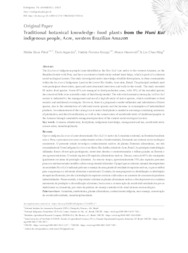Traditional botanical knowledge: food plants from the Huni Kui indigenous people, Acre, western Brazilian Amazon.
Traditional botanical knowledge: food plants from the Huni Kui indigenous people, Acre, western Brazilian Amazon.
Author(s): PILNIK, M. S.; ARGENTIM, T.; KINUPP, V. F.; HAVERROTH, M.; MING, L. C.
Summary: The Kaxinawá indigenous people (auto-identified as the Huni Ku?) are native to the western Amazon, on the Brazilian border with Peru, and have an extensive biodiversity-related knowledge, which is parti of a coherent social-ecological system. Our study investigated native knowledge of edible forest plants, in three communities within the Kaxinawá Indigenous Land on the Lower Rio Jordão, Acre state, Brazil. The principal methods used were participant observation, open and semi-structured interviews and walk-in-the-woods. The study recorded 89 native food species. Some 60% are managed in food-production areas, with 56% of the recorded species have received little or no scientific study of their food potential. The role which natural systems play in Huni Ku? society is indicated by the management and use of a high diversity of native species, which contributes to food security and nutritional sovereignty. However, there is a progressive under-utilization and substitution of forest species, due to the introduction of cultivated exotic species and the increase in consumption of industrialized products. An enhancement of the value given to native food-plants is needed to encourage continuing autonomy of production, and diet diversification, as well as the conservation of sociobiodiversity of traditional peoples in the Amazon through sustainable management practices of the current social-ecological system.
Publication year: 2023
Types of publication: Journal article
Observation
Some of Embrapa's publications are published as ePub files. To read them, use or download one of the following free software options to your computer or mobile device. Android: Google Play Books; IOS: iBooks; Windows and Linux: Calibre.
Access other publications
Access the Agricultural Research Database (BDPA) to consult Embrapa's full library collection and records.
Visit Embrapa Bookstore to purchase books and other publications sold by Embrapa.

